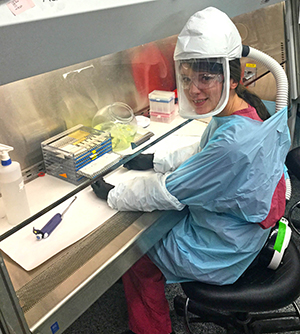News Releases | November 19, 2020
Share ThisBrass, Marble, Glass, Laminate, and Steel: Results from Tests of Coronavirus on Five Common Museum and Library Building Materials

Washington, DC—The REALM project has released results from the sixth round of tests conducted in a Battelle laboratory that determined how long SARS-CoV-2, the virus that causes COVID-19, can remain active on five materials commonly used in furnishings, exhibits, and equipment found in museums, libraries, and archives.
The tests examined architectural glass, marble, countertop laminate, brass, and powder-coated steel. Samples of each material were inoculated with active virus, allowed to dry, and then placed in an environmentally controlled chamber with no outside light or air.
Results show that after two days, SARS-CoV-2 virus was no longer detectable on the brass and marble. After six days, virus was not detected on the glass, laminate, and powder-coated steel. For more information, see the full Test 6 results.
The REopening Archives, Libraries, and Museums (REALM) project is designed to generate scientific information to support the handling of core library, museum, and archival materials as these institutions resume operations and reopen to the public. As part of this research, the REALM project is studying how long the SARS-CoV-2 virus survives on common materials and methods to mitigate exposure. Test 6 focused on common building materials. Results from the previous five tests are available on the REALM website.
The REALM project also makes available a compilation of SARS-CoV-2 scientific research, which summarizes current research on how the virus spreads, its survival on materials and surfaces, and the effectiveness of various prevention and decontamination measures. The research review highlights growing evidence that direct contact and respiratory droplets appear to be the primary modes of spread, and that aerosols may be a contributor to infection.
These findings add to the evolving scientific understanding regarding SARS-CoV-2, which still includes uncertainties about: how much virus is shed by an infected person through coughing, sneezing, talking, breathing, etc.; how much virus is needed to infect someone; and the likelihood of a person becoming infected indirectly through contact with contaminated objects and surfaces.
The REALM project is supported by the Institute of Museum and Library Services (IMLS), the primary source of federal funding for museums and libraries; and OCLC, a nonprofit library technology and research organization; in partnership with Battelle, a not-for-profit global scientific research and development organization.
Project updates are posted at oc.lc/realm-project as they become available. Those interested can also sign up through the project website to receive timely email updates when new information is released.
About the Institute of Museum and Library Services
The Institute of Museum and Library Services is the primary source of federal support for the nation’s libraries and museums. We advance, support, and empower America's museums, libraries, and related organizations through grantmaking, research, and policy development. Our vision is a nation where museums and libraries work together to transform the lives of individuals and communities. To learn more, visit www.imls.gov and follow us on Facebook and Twitter.
About Battelle
Every day, the people of Battelle apply science and technology to solving what matters most. At major technology centers and national laboratories around the world, Battelle conducts research and development, designs and manufactures products, and delivers critical services for government and commercial customers. Headquartered in Columbus, Ohio since its founding in 1929, Battelle serves the national security, health and life sciences, and energy and environmental industries. For more information, visit www.battelle.org.
About OCLC
OCLC is a nonprofit global library cooperative providing shared technology services, original research and community programs so that libraries can better fuel learning, research and innovation. Through OCLC, member libraries cooperatively produce and maintain WorldCat, a comprehensive global network of data about library collections and services. Libraries gain efficiencies through OCLC’s WorldShare, a complete set of library management applications and services built on an open, cloud-based platform. It is through collaboration and sharing of the world’s collected knowledge that libraries can help people find answers they need to solve problems. Together as OCLC, member libraries, staff, and partners make breakthroughs possible.
